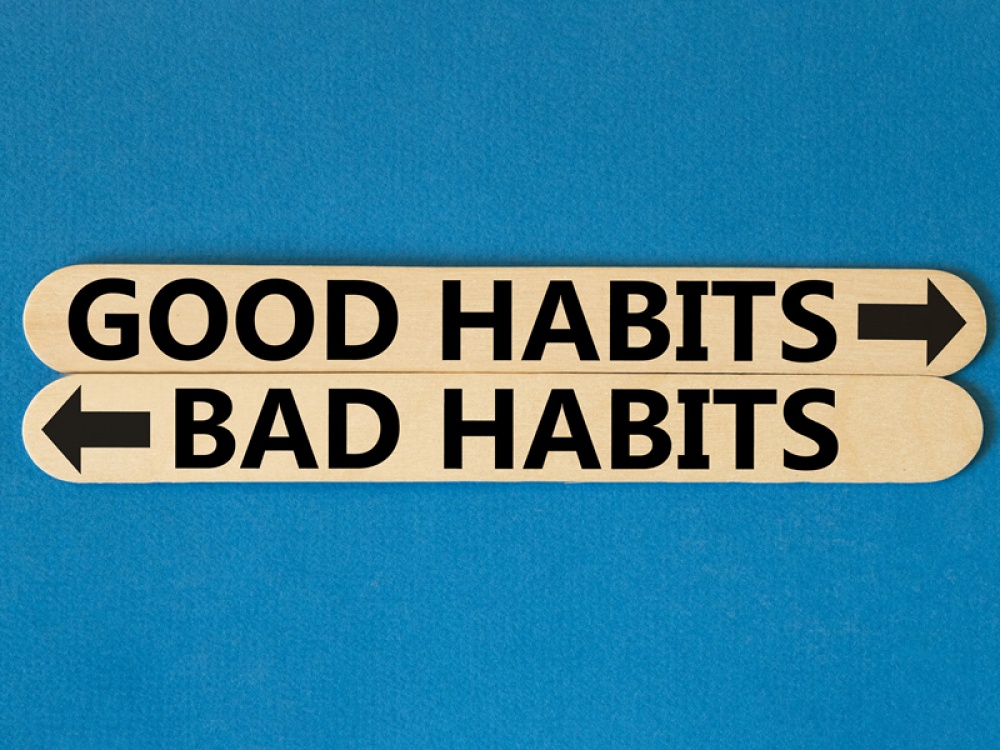How to Ditch Your Bad Habits

It's so easy to fall into automatic habits, ingrained behaviours we perform without much conscious thought
Good Habits
Regular Exercise: Consistency is key. Making exercise a part of your routine, whether it's a daily walk or a gym session, promotes both physical health and mental wellbeing.
Healthy Eating: Opting for nutritious foods can boost overall health and energy levels, fostering a positive relationship with food.
Daily Meditation: Incorporating meditation into your daily routine provides a moment of pause and reflection, promoting mindfulness and emotional wellbeing.
Bad Habits
Mindless Snacking: Snacking impulsively, particularly on unhealthy foods, can contribute to weight gain and poor dietary habits, often driven by boredom or stress.
Excessive Screen Time: Spending too much time glued to screens can hinder productivity, disrupt sleep patterns, and lead to social isolation.
Procrastination: Putting off tasks or avoiding responsibilities can increase stress levels and hinder personal and professional growth.
The Characteristics of Automatic Habits
Routine: Automatic habits are deeply ingrained into our daily routines, often triggered by specific cues or situations, and occur without much conscious thought.
Repetition: These habits are reinforced through repetition, with frequent engagement solidifying their automatic nature over time.
Immunity to Change: Automatic habits can be resistant to change due to their deep integration into our neural pathways, requiring conscious effort and persistence to alter.
Strategies for Change
Identify Triggers and Replace Them: Recognise the cues that initiate unwanted habits and replace them with alternative triggers that steer you toward desired behaviours.
Build a Structured System: Focus on developing systems and processes rather than fixating on outcomes, building clarity, consistency, and accountability into your efforts.
Habit Stacking: Link new habits with existing ones to leverage the power of association, making it easier to integrate desired behaviours into your routine.
The One Percent Rule: Make small, incremental changes consistently over time to achieve significant results, breaking down habits into manageable components.
Practice Mindfulness: Increase awareness of habits through mindfulness techniques, such as meditation or habit journaling, to identify patterns and triggers for change.
Embracing the Journey of Change
Change is not always easy, but with patience, persistence, and a mindful approach, it is possible to transform automatic habits into intentional rituals that align with your goals and values. Celebrate small victories along the way, recognising that each step forward is a testament to your commitment to personal growth and well-being.
Creating Meaningful Connections
In addition to personal habits, our social environment plays a significant role in shaping our behaviours. Surrounding ourselves with individuals who support our goals and share similar values can reinforce positive habits and encourage growth. Whether it's joining a fitness group, participating in mindfulness workshops, or connecting with like-minded individuals online, cultivating a supportive community can provide the accountability and encouragement needed to sustain meaningful change.
Cultivating Self-Compassion
Amidst the journey of change, it's essential to practice self-compassion. Acknowledge that setbacks are a natural part of growth and learning. Instead of berating yourself for slipping back into old habits, approach yourself with kindness and understanding. Reflect on what triggered the setback and use it as an opportunity to refine your strategies for change. Remember, self-compassion nurtures resilience and fosters a positive mindset, empowering you to continue moving forwards on your path to personal transformation.
Nurturing Growth Through Reflection
Reflection is a powerful tool for personal growth. Take time to regularly reflect on your habits, goals, and progress. Ask yourself what is working well and what areas could benefit from improvement. Use insights gained from reflection to adjust your strategies and refine your approach to change. By nurturing a habit of self-reflection, you cultivate greater self-awareness and deepen your commitment to living a purposeful and fulfilling life.
In a world filled with distractions and demands, transforming routine into ritual offers a pathway to greater fulfilment and purpose. By understanding the nature of automatic habits and implementing strategies for change, you can reclaim control over your actions and create a life filled with intention, mindfulness, and joy. So, embrace the journey of change, one mindful step at a time.










